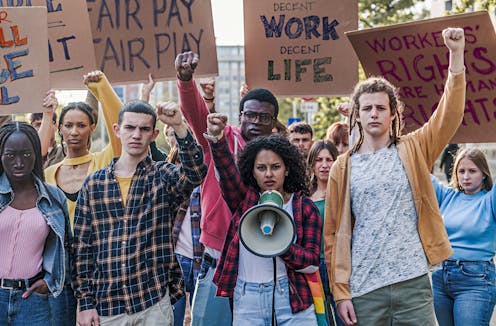Why CEOs and footballers attract different levels of outrage about high pay
- Written by Steven Young, Professor of Accounting, Lancaster University

The average pay of FTSE100 CEOs rose by 16% from £3.38 million in 2021 to £3.91 million in 2022, according to the latest figures from thinktank the High Pay Centre[1]. In the same week this was reported, UK political figure Nigel Farage called outgoing NatWest boss Alison Rose’s £2.4 million payout “a sick joke[2]”. She recently resigned for leaking private financial information about him to the BBC.
On the other hand, senior NHS doctors are embarking on a second round of strikes[3] in response to recent pay erosion and a “final” pay offer of 6%[4] from the government. In the last two months, teachers have agreed to settle for 6.5%[5]. Train drivers[6], nurses[7] and university lecturers[8] are also among a growing list of employees for whom proposed pay increases are failing to beat inflation.
It’s difficult to reconcile these contrasting rates of pay progression, which just seem morally wrong to many people. But understanding some of the nuances surrounding CEO pay can help draw conclusions about what is and is not appropriate when it comes to pay – even if only to calibrate outrage levels.
CEO rewards are set within a global rather than a local market. As with sports stars, it’s necessary to pay at or above the global market rate to attract talent. Other countries, most notably the US[9], tend to pay CEOs more than the UK, which drives up international norms. These international market forces do not operate in many other areas of the UK labour market, although they’re reportedly making it increasingly difficult[10] for the NHS to retain doctors and nurses.
Boards often seek independent advice on CEO pay from “compensation consultants[11]”, but these consultants typically recommend paying above average to attract the best candidate[12].
Another particularly important consideration is that a large fraction (often over 70% according to the High Pay Centre[14]) of a CEO’s total annual pay is variable. For example, bonuses and long-term incentives linked to company performance measures such as share price. This means that CEOs, at least in principle, bear significant compensation risk.
Economic theory argues this risk-bearing should be rewarded, which means expected pay levels[15] rise as compensation risk increases. This is the price we pay for insisting that CEO pay is pegged to performance. This insight also tilts the debate away from a simple discussion of pay levels to a more meaningful conversation about the appropriate strength of the link between pay and performance.
CEO pay versus performance
It may seem easier to accept generous pay growth in line with exceptional company performance that benefits a wider stakeholder group including shareholders, other employees, and the broader economy. But much of the unease surrounding CEO pay reflects a structural asymmetry – executives can benefit from positive performance while apparently being insulated when performance is weak[16]. This leads to claims of rewards for failure[17]. Just how much (downside) compensation risk CEOs bear can vary across individuals, companies and industries.
But even when high pay reflects exceptional company performance, inequality persists. The average FTSE100 CEO currently earns 118 times the median UK employee according to the High Pay Centre (remarkably, this ratio has fallen compared with pre-pandemic levels). For example, the ratio stood at 149:1 in 2016 according to other research[18]). Meanwhile campaign group ShareAction reports that only 50%[19] of FTSE100 companies pay the living wage.
But there is also an argument that society is guilty of double standards when corporate bosses are singled out for special pay outrage while pay extremes in other spheres are condoned.
Soaring soccer pay
Eye-watering pay inequity is also commonplace in professional sport. Manchester City’s Erling Haaland[20] reportedly earns £850,000 a week gross (excluding other income from sponsorship and image rights deals) – that’s 1,328 times median UK gross weekly pay[21] in 2022. French football superstar Kylian Mbappé’s[22] contracted gross salary at Paris Saint-Germain is estimated at close to £1 million per week (not including image rights deals), or 1,562 times median UK gross pay.
These superstars and the clubs that employ them attract limited public criticism, despite doing more than their fair share to foster pay inequity. Fans seem only too eager for their clubs to sign such statement players despite, even amid increasing ticket prices[24].
So why the apparent inconsistency in the scale and focus of moral outrage? One explanation is that we just don’t recognise the job corporate bosses do as being that remarkable. As a result, we’re not willing to accept high levels of pay inequity between CEOs and the rest of us. In contrast, even the most narcissistic football fan is probably willing to accept that they can’t replicate what Haaland and Mbappé do for their respective teams.
This outrage contradiction could indicate fundamental unfairness, but it may also reflect what we, as a society, choose to value and prioritise in the world of work.
References
- ^ High Pay Centre (highpaycentre.org)
- ^ a sick joke (www.theguardian.com)
- ^ a second round of strikes (www.bma.org.uk)
- ^ a “final” pay offer of 6% (healthmedia.blog.gov.uk)
- ^ settle for 6.5% (neu.org.uk)
- ^ Train drivers (news.stv.tv)
- ^ nurses (www.rcn.org.uk)
- ^ university lecturers (www.bbc.co.uk)
- ^ the US (academic.oup.com)
- ^ increasingly difficult (www.itv.com)
- ^ compensation consultants (www.icaew.com)
- ^ to attract the best candidate (journals.sagepub.com)
- ^ Glynnis Jones/Shutterstock (www.shutterstock.com)
- ^ High Pay Centre (highpaycentre.org)
- ^ expected pay levels (academic.oup.com)
- ^ insulated when performance is weak (onlinelibrary.wiley.com)
- ^ rewards for failure (money.cnn.com)
- ^ other research (www.cipd.org)
- ^ only 50% (shareaction.org)
- ^ Erling Haaland (www.dailymail.co.uk)
- ^ median UK gross weekly pay (www.ons.gov.uk)
- ^ football superstar Kylian Mbappé’s (news.sky.com)
- ^ Victor Velter/Shutterstock (www.shutterstock.com)
- ^ increasing ticket prices (www.mirror.co.uk)







